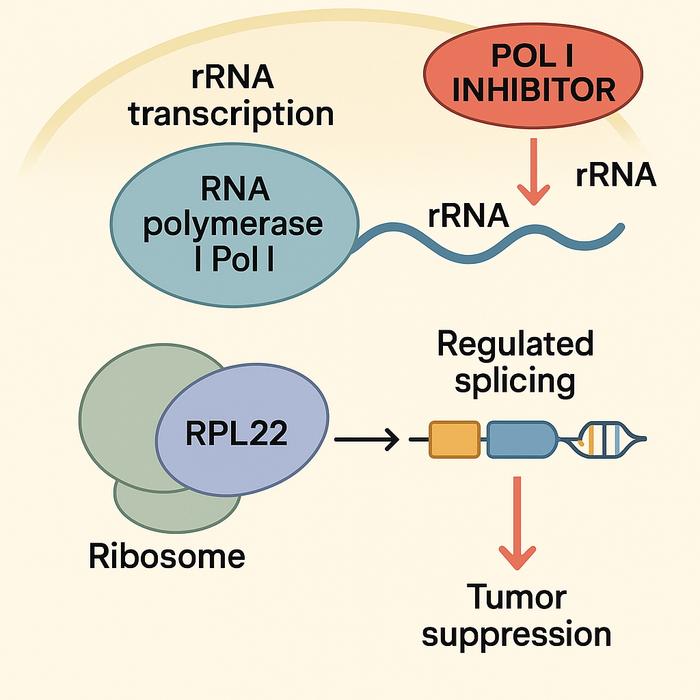In a groundbreaking study published recently in Cell Chemical Biology, researchers from Johns Hopkins University have uncovered a novel tumor-suppressive pathway that opens promising new avenues for combating notoriously resilient cancers. The investigation sheds light on the intricate interplay between ribosomal RNA (rRNA) production and RNA splicing in cancer cells, revealing critical molecular mechanisms that could revolutionize therapeutic strategies against malignancies resistant to conventional treatments.
At the heart of this discovery lies RNA Polymerase I (Pol I), the enzyme responsible for transcribing ribosomal RNA genes—a vital step in the assembly of ribosomes, the cellular machinery that translates genetic codes into functional proteins. While aberrant ribosome biogenesis has historically been recognized as a hallmark of cancer, this study elucidates a previously unappreciated layer of complexity: the connection between rRNA synthesis and the regulation of RNA splicing, a process that enables a single gene to produce diverse protein variants through selective editing of precursor RNA transcripts.
Led by Dr. Marikki Laiho, an expert in Radiation Oncology and Molecular Radiation Sciences, the team demonstrated that pharmacological inhibition of Pol I instigates a unique cellular stress response that reprograms RNA splicing patterns in cancer cells. This reprogramming selectively impairs tumor growth by altering the production of protein isoforms crucial for cancer cell survival and proliferation. Central to this mechanism are ribosomal proteins RPL22 and its paralog RPL22L1, as well as the MDM4 protein, all of which participate in coordinating the dynamic crosstalk between ribosome biogenesis and splicing modulation.
The study employed BMH-21, a small molecule developed in collaboration with Johns Hopkins pharmacology specialists, to obstruct Pol I activity in a comprehensive panel of over 300 cancer cell lines. Strikingly, cancers harboring mutations in RPL22 or exhibiting elevated levels of RPL22L1 and MDM4 were particularly vulnerable to Pol I inhibition. Notably, these molecular alterations frequently occur in tumors characterized by mismatch repair deficiency (MMRd), a genetic condition involving defects in DNA repair pathways. MMRd leads to an accumulation of genomic mutations and is commonly observed in colorectal, gastric, and uterine cancers, which often show resistance to standard therapies.
Further extending their findings beyond cell culture, the researchers evaluated a novel Pol I inhibitor, BOB-42, in animal tumor models that recapitulate patient-derived malignancies bearing these critical genetic signatures. Treatment with BOB-42 resulted in significant tumor suppression, with reductions in tumor size reaching up to 77% in aggressive melanoma and colorectal cancer models. These preclinical successes highlight the therapeutic potential of targeting the rRNA synthesis-splicing axis in cancers that evade existing treatment modalities.
Beyond its tumor-suppressive effects, the study suggests a compelling link between altered splicing patterns induced by Pol I inhibition and enhanced tumor immunogenicity. By reshaping the protein landscape presented by cancer cells, changes in RNA splicing may unmask novel tumor antigens, potentially improving recognition by the immune system. Consequently, the combination of Pol I inhibitors with immunotherapy agents could synergize to overcome immune evasion, a major hurdle in effective cancer treatment.
Dr. Laiho elaborated on this innovative concept, emphasizing the dual role of the ribosomal protein RPL22. Traditionally viewed as a structural ribosomal component, RPL22 also exerts regulatory control over selective RNA splicing. This dual functionality underscores a deeper level of cellular regulation wherein rRNA synthesis and splicing are intimately coordinated to dictate cancer cell behavior. Such a paradigm shift in understanding ribosome-related oncogenic processes could lead to transformative advances in precision oncology.
The implications of this work extend beyond therapeutic targeting of Pol I. By delineating the molecular underpinnings of cancer cells’ sensitivity to rRNA synthesis inhibition, the study offers insights into the vulnerabilities of mismatch repair-deficient tumors, which are often characterized by high mutation burden and poor prognosis. Therapeutic strategies that exploit these vulnerabilities could fill an urgent need for more effective treatments in this patient population.
Moreover, the discovery paves the way for future investigations into the role of ribosomal proteins in RNA metabolism and how their dysregulation contributes to tumorigenesis. The intersection of ribosome biogenesis with RNA splicing regulation represents a fertile frontier for molecular oncology research, promising new biomarkers and drug targets for a variety of cancers.
This pioneering research involved a multidisciplinary team, including insights from experts in cancer biology, pharmacology, and radiation oncology. Their collaborative efforts, complemented by funding from prominent institutions such as the National Institutes of Health and private foundations, exemplify the concerted push toward unraveling complex cancer vulnerabilities.
Acknowledging the translational potential of their findings, the researchers hold intellectual property rights related to Pol I inhibitors, underscoring the practical ambitions of bringing these discoveries from bench to bedside. Future clinical trials assessing the safety and efficacy of compounds like BMH-21 and BOB-42 will be critical to validate their therapeutic promise in cancer patients.
The study profoundly redefines our understanding of how ribosomal RNA synthesis intricately controls tumor cell physiology, revealing an exploitable Achilles’ heel within cancer’s machinery. By co-opting fundamental processes of RNA production and splicing regulation, this research charts a novel course for developing targeted, mechanism-based cancer therapies that could markedly improve patient outcomes in malignancies refractory to current interventions.
Subject of Research: Cancer Biology, Ribosome Biogenesis, RNA Splicing, Therapeutic Targeting
Article Title: Ribosomal RNA Synthesis and RNA Splicing Interplay as a Novel Tumor-Suppressive Pathway in Mismatch Repair-Deficient Cancers
News Publication Date: June 18, 2024
Web References:
- Johns Hopkins Kimmel Cancer Center: https://www.hopkinsmedicine.org/kimmel-cancer-center
- Department of Radiation Oncology and Molecular Radiation Sciences: https://www.hopkinsmedicine.org/radiation-oncology
- Cell Chemical Biology Journal: https://www.cell.com/cell-chemical-biology/home
Image Credits: Courtesy of Cell Chemical Biology
Keywords: Cells, Cancer Stem Cells, Ribosomal RNA, RNA Polymerase I, Mismatch Repair Deficiency, RPL22, RNA Splicing, Tumor Suppression, Immunotherapy, Cancer Therapeutics




